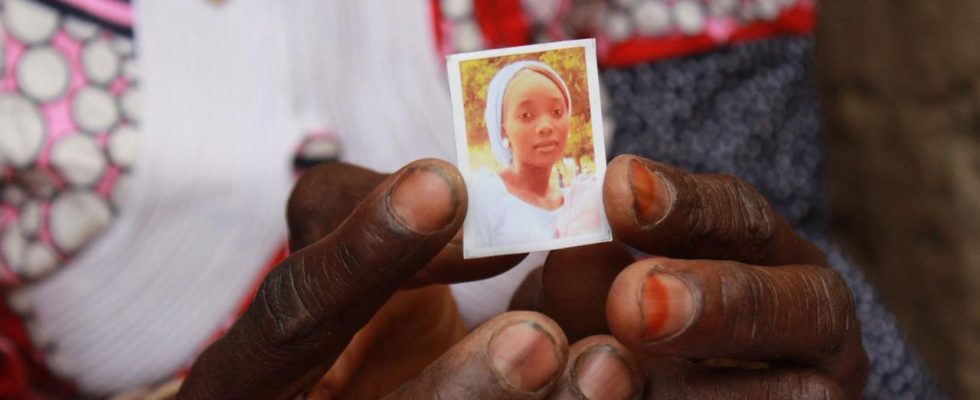Ten years ago, the terrorist militia Boko Haram abducted more than 270 schoolgirls in Nigeria. To date, not everyone has been freed – and kidnapping has become the business model of competing gangs.
Perhaps the greatest pain is caused by this uncertainty. An uncertainty that Nkeki Muttah wakes up with every morning – for ten years. He is one of dozens of people in Nigeria who still fear and hope that one day they will be able to embrace their loved ones again: “Our dearest ones, our children, are in the hands of someone. Whether they are dead or still alive Life, we don’t know.”
Ten years ago, Boko Haram terrorists kidnapped two of the man’s nieces. The attackers came under the cover of darkness. They entered a boarding school in the small town of Chibok in the middle of the night from April 14th to 15th, 2014, disguised as army soldiers. A total of 276 girls were surprised while they were sleeping, forced onto trucks and cars, and taken to an unknown location.
90 kidnapped people are still missing
The outcry of horror at that time could be heard around the world: everyone suddenly knew the name Boko Haram. Michelle Obama, then US President’s wife, like many others, held a sign with the hashtag “Bring back our girls” into the cameras. The US sent military and police forces to Nigeria. Some girls managed to escape, while many others were released after negotiations between the government and terrorists.
To date, however, not all of the girls have returned home; more than 90 of them are still missing. Nkeki Muttah accuses: “The government has no will to return these girls to their parents.”
It is difficult to deny that in the last ten years the Nigerian government has neither been able to break the back of the Boko Haram terrorists nor to prevent the emergence of a real kidnapping industry.
Kidnappings as Business model
The 2014 attack has now been copied many times. Today it is a toxic mix of Islamist terrorists and criminal gangs that have found a macabre business model in kidnapping, as Nigerian security expert Kabir Adamu explains.
“There is a political component. They are trying to expose the government. Secondly, they finance their operations through extorted ransom money,” says Adamu. There is now also a kind of criminal competition: the leaders of these gangs try to outdo each other with mass kidnappings and thus gain an image among their peers.
Boko Haram remains active
As far as Boko Haram is concerned, one should not succumb to the fallacy that the terrorists are less active just because they no longer produce the same headlines as in 2014, warns West Africa expert Vincent Foucher of the Crisis Group organization – even if the terrorist group is in… split two opposing camps.
One of these camps then allied itself with the terrorist militia “Islamic State” (IS), which is primarily active in neighboring countries such as Niger and Mali. This arm in particular is still extremely powerful, Foucher warns: “The ‘Islamic State’ sends money, it sends advisors, it sends trainers.”
In addition, the extreme poverty in the countryside, the competition intensified by population growth, and the bitter struggle for resources make it easy for the jihadists to continue recruiting from among frustrated young people. “They are still there and present. And as long as the causes are not eliminated, the group will continue to exist,” says Ulf Laessing from the Konrad Adenauer Foundation in Bamako, Malia.
Nigeria’s army, one of the most powerful in Africa, has managed to wrest several cities from the grip of Boko Haram in recent years. Nevertheless, according to Foucher, the situation remains tricky: “The government has invested heavily in drones, in airplanes, in helicopters. It can therefore hold important cities. But going into the forests and fighting the jihadists there is a problem.” Entire areas of the country continue to be controlled by the militias.
Increasing networking of terrorists
In addition, terrorists in West Africa are apparently increasingly networking with each other. This is proven by the IS alliance with one arm of Boko Haram – and the Al-Qaeda connection with the other Boko Haram camp. Overall, the experts agree, the extremists in the West African crisis belt are in the process of further expanding their sphere of influence.
According to a survey by the Armed Conflict Location and Event Data Project, the central Sahel states experienced a new record year of violence in 2023: “Large parts of Burkina Faso are outside the government’s control. In Mali, the army is barely able to contain the jihadists “And the number of attacks is currently increasing in Niger,” says Laessing, describing the situation in the Sahel. The terrorist groups are also trying to establish themselves in largely stable coastal states, in the direction of Ivory Coast or Senegal. Even ten years after the mass kidnapping by Boko Haram in Nigeria, when the world looks at West Africa, it sees a region in crisis.
Two incidents from the beginning of March show how flourishing the kidnapping industry is in Nigeria: More than 130 children were abducted. It brought back memories of Chibok ten years ago. In this case, all of the children have now been freed. The hope that the relatives of the girls kidnapped in Chibok will one day be able to see their loved ones again is dwindling more and more after ten years.
Kai Küstner, NDR, tagesschau, April 12, 2024 1:41 p.m

